Libertà e natura dell’uomo in Antonio Genovesi
Titolo Rivista RIVISTA DI STORIA DELLA FILOSOFIA
Autori/Curatori Saverio Di Liso
Anno di pubblicazione 2012 Fascicolo 2012/2
Lingua Italiano Numero pagine 23 P. 293-315 Dimensione file 519 KB
DOI 10.3280/SF2012-002007
Il DOI è il codice a barre della proprietà intellettuale: per saperne di più
clicca qui
Qui sotto puoi vedere in anteprima la prima pagina di questo articolo.
Se questo articolo ti interessa, lo puoi acquistare (e scaricare in formato pdf) seguendo le facili indicazioni per acquistare il download credit. Acquista Download Credits per scaricare questo Articolo in formato PDF

FrancoAngeli è membro della Publishers International Linking Association, Inc (PILA), associazione indipendente e non profit per facilitare (attraverso i servizi tecnologici implementati da CrossRef.org) l’accesso degli studiosi ai contenuti digitali nelle pubblicazioni professionali e scientifiche.
Freedom and human nature in Antonio Genovesi. The moral experience of the human being, which is triggered by irritation of the neural network (tela nervosa) and other physiological components, has its true principle of action in free will and reason. Natural freedom constitutes the ground for the other types of freedom (religious freedom and freedom from human authority), which are achieved through the historical and critical use of reason (libertas philosophandi), namely by applying the "benefit" principle. In outlining the nature of the human being, Antonio Genovesi compares his main ideas with the most recent ideas in physics and proposes an original essay on the origins of society. It reconciles a traditional conception of universalistic ethics with a social application of Newtonian notions of centripetal and centrifugal forces. His aim is also to unify "eclectically" a universalistic with a utilitarian conception of law and justice ("the least of evils"), an ideal with an instrumental notion of reason ("reason as calculation"), and a contemplation of the immutable nature of human beings with a descriptive analysis of the customs of different peoples.
Parole chiave:Antonio Genovesi, eclecticism, human nature, freedom, ethics, origins of society.
- Genovesi e la Metafisica Maria Teresa Marcialis, in RIVISTA DI STORIA DELLA FILOSOFIA 4/2017 pp.665
DOI: 10.3280/SF2017-004010
Saverio Di Liso, Libertà e natura dell’uomo in Antonio Genovesi in "RIVISTA DI STORIA DELLA FILOSOFIA" 2/2012, pp 293-315, DOI: 10.3280/SF2012-002007